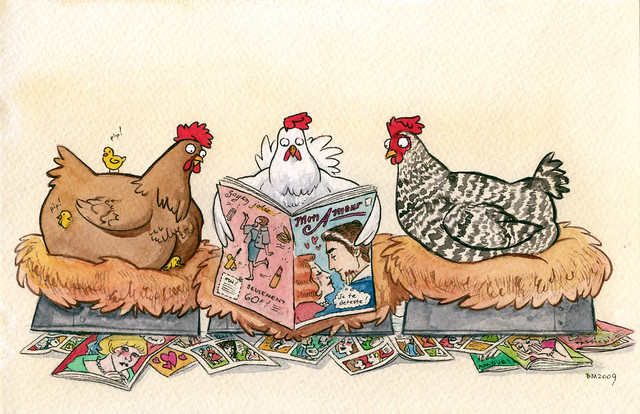 |
| Three French hens |
The word was originally "Frankish", derived from the Franks who invaded Gaul after the fall of Rome and gave France its name (more about them in this post: http://katherinebarber.blogspot.ca/2013/01/frankly-im-incensed.html).
But a phonetic phenomenon happened in Old English words where the second syllable had an "i" sound in it, called "i-mutation" (more about this when we get to the geese a-laying). To put it simply, the "i" affected the sound of the vowel in the preceding syllable, so that Frankish morphed into "frenkish" and then got squished down to "Frenksh", ultimately written as "French".
Well, enough with the ancient phonetics, you really want to know about the connections between "French" and ... sexually transmitted diseases.
When Europe experienced its first recorded outbreak of syphilis after the French siege of Naples in 1495, the Italians blamed the French, and called it "the French disease". The French had other ideas, and not surprisingly called it "the Naples disease". But "French" became the popular designation throughout Europe thanks to a poem published in 1530: Syphilis, sive Morbvs Gallicvs ‘Syphilis, or the French disease’). The author was (it goes without saying) Italian. Syphilus was the name of a shepherd in the poem, supposedly the first sufferer from the disease. Oh for the good old days of literature, when people wrote poems about ... venereal diseases.
The English were not slow to hop on the anti-French bandwagon, and called this new "pox" by various francophobic names: French compliment, French disease, French evil, French goods, French marbles, French measles, French pox. But, being equal-opportunity xenophobes, they also called it variously "Neapolitan", "Spanish", "Persian", and even occasionally "Scottish". One misguided person proposed the "English pox", but that surprisingly did not catch on.
Having wandered quite some distance from the origin of this post, I should say that I do not think there is any nasty innuendo in the true love's third gift!
And to take your mind away from syphilis, here are some adorable hens (and yes, they are French) from the delightful ballet La Fille mal Gardée by Frederick Ashton:
http://youtu.be/oAAodYX3xI8
http://katherinebarber.blogspot.ca/2015/01/12-days-of-wordlady-twelfth-day.html
For pipers, click here:
http://katherinebarber.blogspot.ca/2015/01/12-days-of-wordlady-pipers.html
For lords a-leaping:
http://katherinebarber.blogspot.ca/2015/01/12-days-of-wordlady-lords-leaping.html
For why I'm not the Word Wench:
http://katherinebarber.blogspot.ca/2014/12/12-days-of-wordlady-nine-ladies-dancing.html
For why milkmaids work in a dairy rather than a milkery:
http://katherinebarber.blogspot.ca/2014/12/12-days-of-wordlady-8-maids-milking.html
For what swans have to do with singing, click here:
http://katherinebarber.blogspot.ca/2014/12/12-days-of-wordlady-swans-swimming.html
Why we don't say "gooses" and "gooselings:
http://katherinebarber.blogspot.ca/2014/12/12-days-of-wordlady-geese-laying.html
For why we don't say "fiveth", "fiveteen", and "fivety", click here:
http://katherinebarber.blogspot.ca/2014/12/12-days-of-wordlady-fifth-day.html
For why it was OK to call the Virgin Mary a "bird", click here:
http://katherinebarber.blogspot.ca/2014/12/12-days-of-wordlady-calling-birds.html
For turtle-doves, click here: http://katherinebarber.blogspot.ca/2014/12/12-days-of-wordlady-turtle-doves.html
For what partridges have to do with farting, click here:
http://katherinebarber.blogspot.ca/2013/12/12-days-of-wordlady-partridge.html
P.S.
If you find the English language fascinating, you might enjoy regular
updates about English usage and word origins from Wordlady. Receive
every new post delivered right to your inbox! You can either:
use
the subscribe window at the top of this page
(if
you are reading this on a mobile device): send me an email at
wordlady.barber@gmail.com
Privacy
policy: we will not sell, rent, or give your name or address to
anyone. You can unsubscribe at any point.
Follow
me on twitter: @thewordlady

> Oh for the good old days of literature, when people wrote poems about ... venereal diseases.
ReplyDeleteFor a more modern equivalent, see "RENT".
My daughter rented four chickens this past summer. While lovely and generous with their eggs, they never "performed" quite like this quintet!
ReplyDeleteshould have got them into ballet classes!
Delete